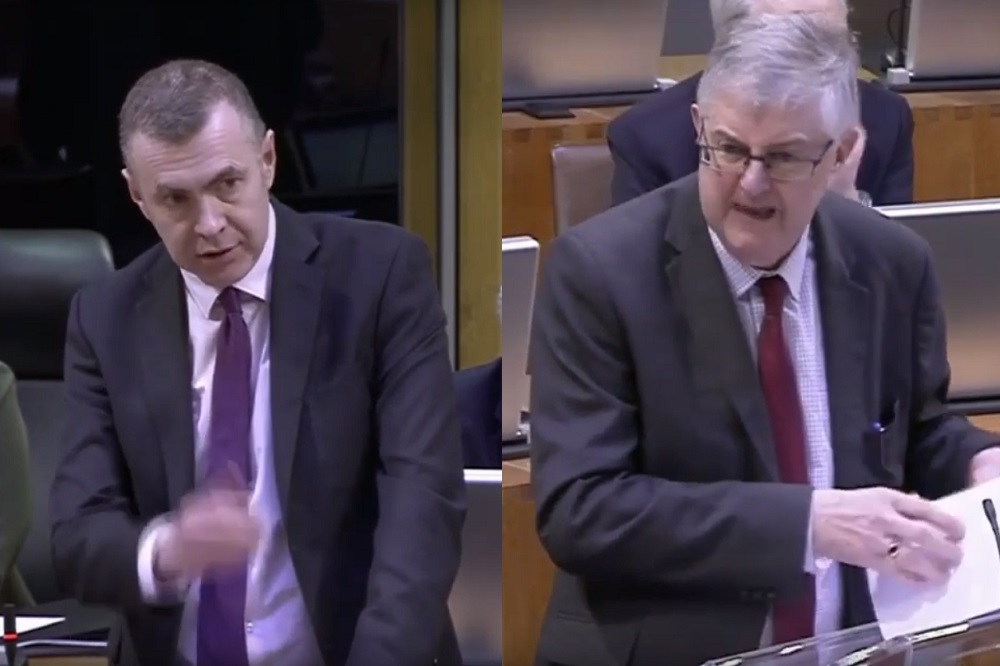Today’s Senedd roundup: First Minister “makes no apology” for use of private management consultants in the NHS

Owen Donovan, Senedd Home
First Minister’s Questions
Plaid Cymru leader, Adam Price AM (Plaid, Carms. E. & Dinefwr), brought up the findings of a freedom of information request which revealed that in the last year, 37 private management consultants have been hired for use in the NHS at a total cost of just over £2 million. PricewaterhouseCooper was paid £335,000 for twelve weeks work on managing winter pressures at Betsi Cadwaladr health board.
“First Minister, we both agree that creeping privatisation is a threat to the NHS. The surprising thing, perhaps, is that that threat, in part, comes from you….Don’t you think that that money would have been better spent on more doctors, nurses and social carers to manage the winter crisis, rather than pen-pushers with PowerPoint presentations?”
– Adam Price AM
The First Minister repeated what he’s said in response to similar questions – that appointment of management consultants was taken on the advice of the Senedd’s Public Accounts Committee. He made no apology at all for ensuring the NHS works as well as it can whilst investing record amounts of money in health services. He then took another dig at what he described as Adam Price’s “tour of television studios” and Plaid’s Unite to Remain electoral agreement.
Meeting the devolution challenge
With this being the last First Minister’s Questions of 2019 – the 20th anniversary year of devolution – Leader of the Opposition, Paul Davies AM (Con, Preseli Pembs.) reflected on three challenges set down by the first First Secretary/Minister, Alun Michael:
“First, we must deliver a better life for the people of Wales. Secondly, we must deliver a sense of unity and purpose and, thirdly, we have to deliver a new confidence in ourselves in Wales and in political life. First Minister, Welsh Labour have run the Welsh Government for over 20 years, on reflection, can you honestly say that the challenge set by Alun Michael has been met?”
– Leader of the Opposition, Paul Davies AM
The First Minister said that despite everything the Conservatives had done to “undermine the prospects of a better life” in Wales after a decade of austerity and cancellation of projects by the UK Government which could’ve made a difference.
“This party stands up for Wales in the face of every onslaught that his party performs. We stand up for people faced with the fear and the horror of Universal Credit. We stand up for the people of Wales where they have to deal with the consequences….of his party’s policies, which will create 50,000 more children in poverty here in Wales. We stand up for those people who go in every day to our public services – starved, to quote the Leader of the Opposition; cash-starved by his party – to try and make those services as good as they can possibly be.”
– First Minister, Mark Drakeford (Lab, Cardiff West)
Labour’s “credible Leave option” is no Leave option at all
2019 couldn’t end without another Brexit question from Mark Reckless AM (BXP, South Wales East), who described UK Labour’s position on renegotiating a “credible Leave option” as being nothing of the sort. Any second referendum, as promised, would effectively be “between Remain and Remain”. He also suggested that any attempt at lowering the voting age to 16 would be an attempt to rig a second referendum.
“He’s correct in this: only a vote for Labour will put this deeply divisive decision back in the hands of the people, where we believe it belongs….Do I think that 16-year-olds should have a vote in that election? I certainly do, because it is their future and the future of young people and the future of generations to come that would be at stake in such a referendum.”
– First Minister, Mark Drakeford

Committee backs wild animal circus performance ban, but key questions remain unanswered
Environment Committee
Stage 1 Report: Wild Animals & Circuses Bill (pdf)
Published: 6th December 2019
“The fact that the Welsh Government has introduced the Bill on ethical grounds has raised some challenging questions, such as why is it ethically acceptable for wild animals to perform in other settings but not in circuses? Why is it ethically acceptable for domesticated animals to perform in circuses? Should any animal be expected to perform purely for entertainment? The Welsh Government has yet to answer some of these questions.”
– Committee Chair, Mike Hedges AM (Lab, Swansea East)
- Opponents to a ban argue welfare concerns lack evidence
There were strong views either way on the need for a ban. Supporters said the needs of wild animals simply can’t be met in a circus environment, while opponents argued that a ban would be disproportionate and the use of wild animals should be carefully licenced instead.
Opponents argued the Welsh Government proposed a ban for purely ethical reasons and couldn’t prove arguments that wild animals were poorly treated.
Northumbria University’s Prof. Ron Beadle said a ban on ethical grounds had to prove the use of wild animals had an overwhelmingly negative impact. Other opponents argued that the ethical justification for a ban based on animal dignity could easily be extended to falconry and horse racing.
Animal welfare organisations pointed towards public support for a ban (though opponents argued this was organised opposition), which is as high as 80%. RSPCA Cymru said there had been a clear change in attitudes based on a greater understanding of animal psychology.
Opponents also argued a ban would infringe on human rights as it targeted a cultural minority and infringed on a right to own and enjoy property and pets.
A majority of committee members agreed that AMs should support the general principles of the Bill, but this wasn’t unanimous (and there’s no idea of who rejected it).
- It was argued that the scope of the ban is too narrow
The ban will only apply to the use of wild, non-domesticated animals in performances by travelling circuses. Circuses will still be able to tour with wild animals and train with them. Supporters of a ban argued the Bill should support an outright ban on the use of wild animals, including for display and training, as well as their use in static circuses.
One respondent, Freedom for Animals, argued for a ban on domesticated animals too, saying they suffered from the same issues as wild animals. PETA supported a domesticated animal ban as a long-term aspiration. There were, however, arguments made against extending a performance ban to cover domesticated animals:
:
The Environment, Energy & Rural Affairs Minister confirmed the ban will only apply to wild animal performances with travelling circuses; they’ll still be able to keep the animals.
The Committee concluded the Minister’s answers were “weak and contradictory” and demanded further clarification on the status of non-performing wild animals, as well as the use of wild animals in static circuses and the use of domesticated animals.
- There are no provisions in the Bill on the future of the wild animals themselves
There are 19 wild animals kept and used by UK travelling circuses. There’s nothing in the Bill saying what should happen to them after a performance ban. Circus Mondao said they might have to be kept in winter quarters, while ban supporters argued the animals should be rehomed in sanctuaries.
The Minister said it was up to the owners to decide what happened to them, though the Committee recommended the Welsh Government reports back on any discussions with DEFRA about support and advice available to travelling circuses – including rehoming options.

Photo by StockSnap from Pixabay
Modern student expectations should be at the heart of future post-16 education law
Children & Young People Committee
Post-Legislative Scrutiny – Higher Education Act 2015 (pdf)
Published: 4th December 2019
“We want to ensure that the original ambitions for the reforms – which include prioritising learners’ needs and realising the talents of all learners – are not squeezed and wrung out of the (proposed) Tertiary Education Bill. I urge the Welsh Government to consider carefully our recommendations and to maintain that original ambition. The Higher Education Act is focused on providers – the new Bill must be focused more on learners”.
– Committee Chair, Lynne Neagle AM (Lab, Torfaen)
- Gaps remain in how higher education is regulated
The Act works in such a way that higher education providers can deliver courses with little to no oversight by the Higher Education Funding Council for Wales (HEFCW), as the Act only applies to courses supported by Welsh Government grants and loans (known as “designated courses”).
This means that some designated part-time undergraduate and postgraduate courses which receive funding from sources other than HEFCW fall outside the regulatory framework.
Also, as HEFCW are responsible for higher education and Estyn are responsible for further education, there are examples of FE colleges which offer both levels of courses being subject to oversight by both organisations.
The Committee concluded that any future Tertiary Education Bill had to clear up these anomalies and provide an integrated, consistent, future-proofed approach to all forms of post-16 education.
- HEFCW’s powers under the Act are “difficult to use”
The 2015 Act granted HEFCW some powers to take action against regulated institutions, such as issuing sanctions. As the powers were said to be potentially “existentially threatening” (even described as “nuclear”) to some course providers, the process involved is often slow and HEFCW often seeks a more proportionate method of addressing shortfalls.
An example’s given whereby HEFCW could effectively close down an institution by refusing to approve a fee plan if the provider fails to do what they’re told. The fee and access plans themselves – designed to widen access to university – were also criticised as being overly bureaucratic and run on short timeframes.
The UCU trade union said the 2015 Act often fails to provide HEFCW with the necessary tools to make interventions on governance arrangements. The Committee agreed and recommended that any future Act sets the conditions for good governance at institutions.
- Student interests aren’t paramount in the Act
The Act heavily towards regulated finances based on the amount of public funding at stake at the expense of the key aim to react to risks to student interests.
There was some disagreement on what “student interests” actually means, though the Committee were told it’s supposed to mean maintaining quality of courses and financial viability of an institution. There was no wider requirement regarding student experience, student well-being or value for money (i.e. graduate employability).
The Committee recommended that in future, there’s a move away from regulation based on public funding to a greater focus on the safeguarding of student interests to ensure reasonable student expectations are met by post-16 providers.

First Minister rejects notion Welsh Labour have been overridden on free social care by Corbyn
The First Minister has told ITV Wales that he hasn’t been “bounced” into pursuing free social care in Wales by the UK Leader, Jeremy Corbyn, as part of Labour’s 2019 UK General Election pledges.
Jeremy Corbyn said Labour would develop a plan for free social care in Wales, but Welsh Labour’s policy to date has been to cap charges for domestic care.
The First Minister said: “….if we have the funding, of course we will match the standards and the qualification of social care that will be there in other parts of the United Kingdom because we already exceed them.”
Labour had been chastised, some might argue embarrassed, by Plaid Cymru during election debates for promising things at a UK level which they could deliver at a Welsh level where they’re in government.
Support our Nation today
For the price of a cup of coffee a month you can help us create an independent, not-for-profit, national news service for the people of Wales, by the people of Wales.





The First Minister’s claim that Welsh Labour is fighting for Wales is laughable. With an economic policy that amounts to managed decline, which never seems to get beyond thinking that yet another tourist development complete with zip wire is the one size fits all route to economic salvation. The recent opening of AMRC Cymru is an exception, but that’s been done in association with the University of Sheffield and is a cross border initiative. Nothing wrong in this in principal, but it could lead to a situation where Wales is, once again a junior partner and marginalised, thus gaining little… Read more »
Correct to say “Adam Price is to be congratulated for at last taking the battle to Welsh Labour” … but he needs to do it for the full metaphorical 15 rounds to the 2021, not just the odd little flurry of blows in an early round. Labour won’t fall over mid round 1 so it will take a sustained barrage of justifiable criticism from Adam and his entire list of A.M’s plus any good support workers to have any chance of getting the desired result.
… oh , and no popping over to Drakeford’s corner every so often to check that he’s not too badly hurt. To really unsettle him, bring back McEvoy warts and all and unleash some really heavy combination blows. And that’s enough slugfest metaphors for one day !
This is a load of double talk twaddle. Plaid had a chance to kick Drakeford out of office and seriously damage the finances of Cardiff Labour and bottlled out. MC Evoy would have crucified Drakeford at the polls. Plaid is not a Republican party, is afraid of Real Working Class Nationalists because of what we will demand Plaid says and does.